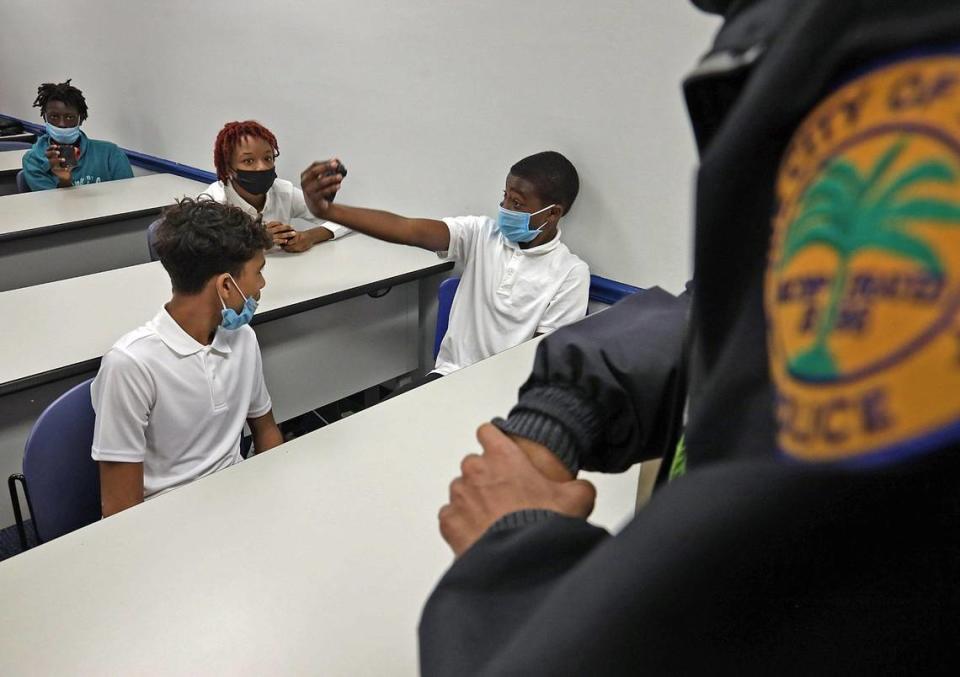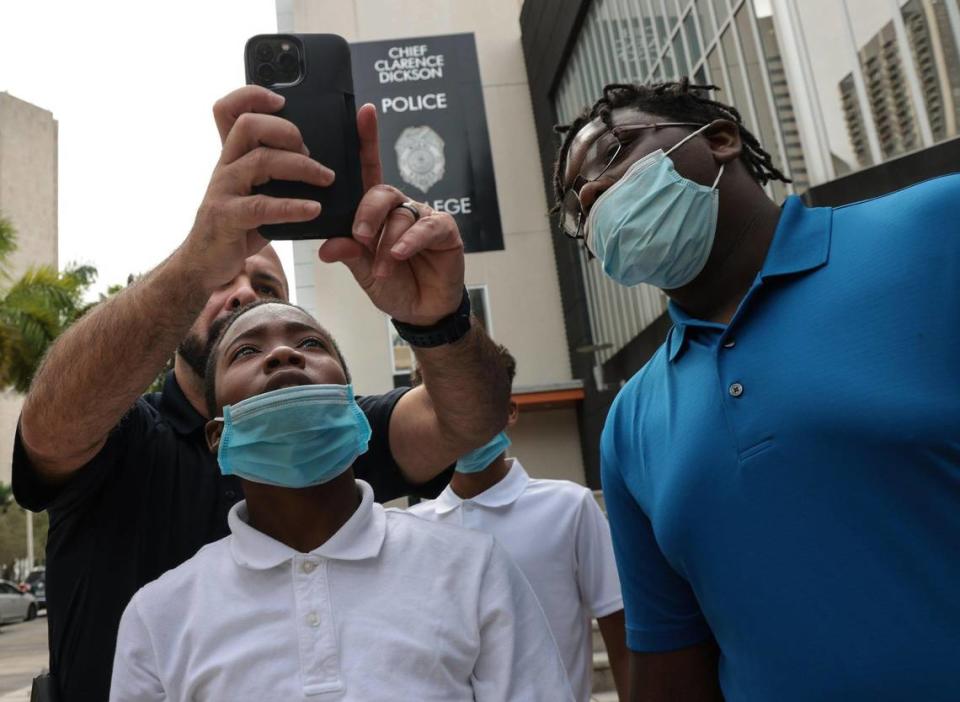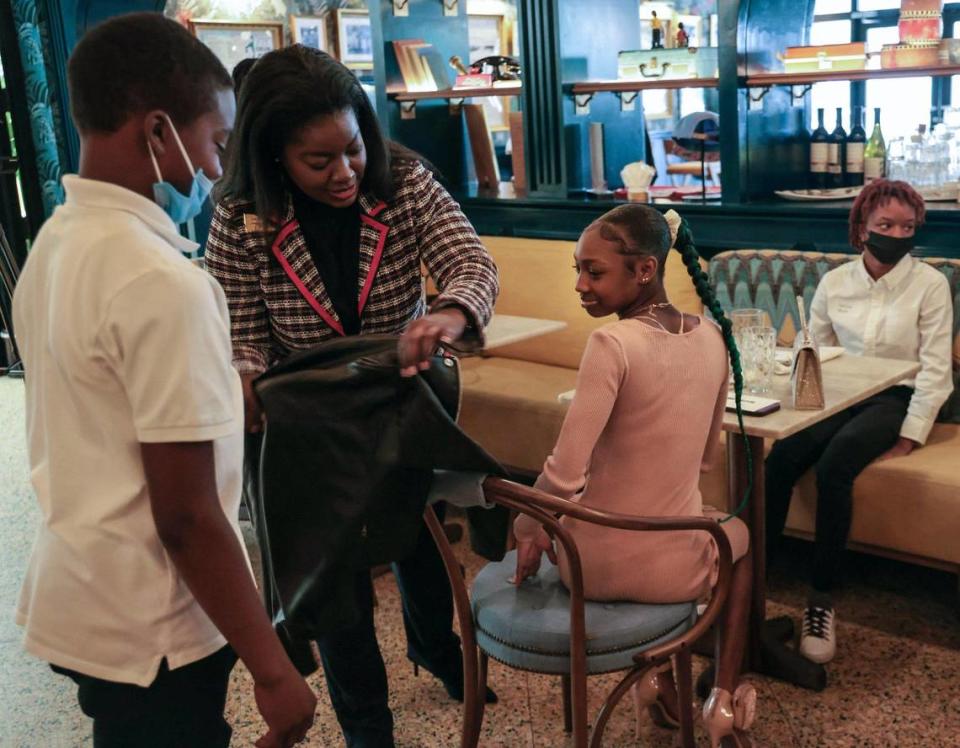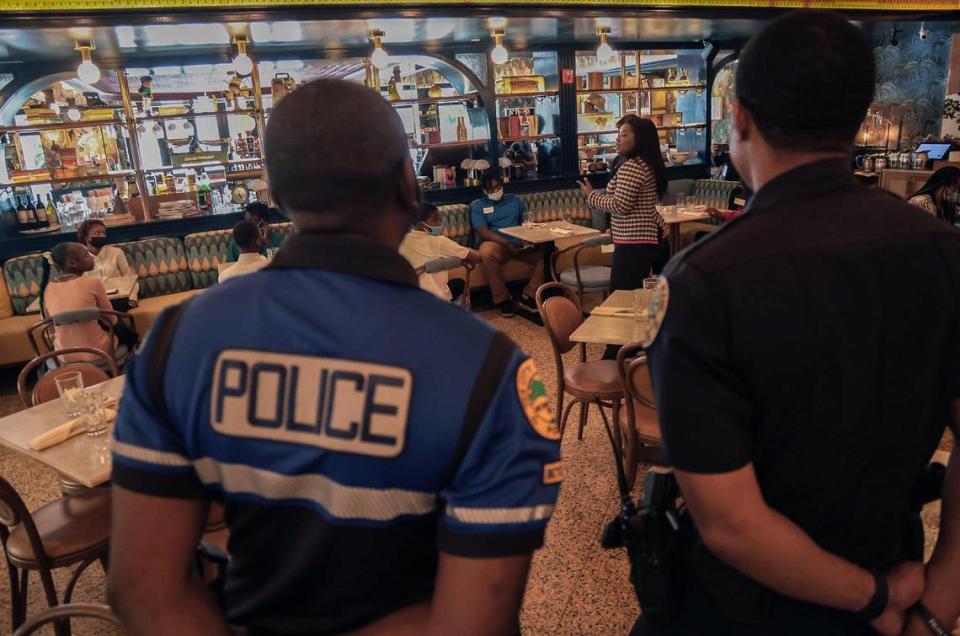‘I thought they would be mean — but they were fun.’ How teens, police learn from each other
As a dozen teens walk through the halls of Miami police headquarters, the first thing they notice are the photos of the police leadership organized in a hierarchical pyramid along the wall, starting with Miami Police Chief Manny Morales.
“What do you notice about these people?” asks Ruban Roberts, who brought the students to the command center.
The teens, primarily 14- and 15-year-olds, shuffle their feet quietly, not sure what to say.
“They are people that look like you,” Roberts says.
Roberts, past president of the Miami chapter of the NAACP, is right. They wall is filled with people of different races and ethnic groups all wearing police uniforms.
“There are people that look like you in your area…I want you to feel comfortable going to them,” Roberts says.
Alongside Roberts, the teens and their two teachers would spend the next 90 minutes touring the inner workings of the command center. They learned about the police department’s use of body cameras, saw the 9-1-1 call center and had a lively discussion of what not to post on social media or text your friends or significant other.

Building trust between teens, police
The tour was part of the Teen Talks program, a program Roberts created to build better relationships between Black teens and police.
“If we can get together and find a way to have a dialogue session … then that will help gain more appreciation for each other’s perspectives,” said Roberts, CEO of RER Consulting, a firm focused on creating programs such as Teen Talks, where government and community organizations work together to reduce youth violence.
Roberts had the idea for Teen Talks after he observed a “rash of police violence against inner city people.”
“You have some police officers that are overzealous because they have an opinion about the community they are serving,” he says. “I believe that some officers had some preconceived notions about people who are coming from certain neighborhoods or certain communities.”
The goal is that programs like Teen Talks will break down stereotypes young people may have about police officers and vice versa.
As the day progressed, that appeared to come to fruition.
In a crisp white polo and a blue mask, 14-year-old Tyquane Hankerson exemplifies what Teen Talks hopes to achieve.
Although his joking demeanor suggests he is the class clown, he asks engaged questions throughout the day. He asks the officers about how their body cameras work and questions them on privacy rights relating to social media photos.

“I thought they would be mean,” says Tyquane, of the officers. But they were “helpful and fun.”
He also learned how to interact with police.
Tyquane explained that if a police officer pulls you over, it is important to make sure they can see your hands.
“Hands can kill…don’t keep them in your pockets and stuff,” says Tyquane, who aspires to play in the NFL but said if he doesn’t make it, he wants to be a detective.
“They can see police officers outside of their norm, and see that they are human as well,” said his teacher, Ericka Reed. “Today gave them an opportunity to network with law enforcement, which will help close the gap within our urban communities and law enforcement.”

Reed was one of two teachers who attended the event with their students. The other, Esther Wilson, expressed similar views.
“This is awesome exposure,’’ she said. “It helps the students to have a more positive relationship with officers and not be so intimidated by them — and respect them as well.”
Lunch at Red Rooster
Following the police headquarters tour, the students were shuttled to Red Rooster, the popular Overtown restaurant founded by Chef Marcus Samuelsson, based on his Red Rooster Harlem. The restaurant, with its island-feel patio and downstairs bar accented with a wood ceiling and rattan seating, caught the attention of the students.
“Has anyone ever been in a restaurant like this?” asks Roberts.
The restaurant had been reserved for the students, who feasted on marinated chicken, mashed potatoes, lemonade and ice cream for dessert.
But the lunch came with a lesson: The teens received an etiquette course detailing proper handshakes, posture and utensil use.

Following the lesson, Roberts got up to speak.
“I want you to understand the magnitude of what we did today,” he said. “This is a priceless experience.”
Catching up in school
The middle schoolers who attended Teen Talks are not part of a traditional school. They all attend the Secondary Student Success Center, part of Miami-Dade Public School’s Educational Alternative Outreach program.
The Secondary Student Success Center is a credit recovery program for middle school students who have been held back a year or two and need to catch up outside of a traditional classroom.
“Some of them have had behavior problems and are failing their classes and they are over-age for the grade that they are in,” said Wilson, one of the teachers. Students can be referred to the program by their old teachers or a judge as they leave the judicial system.
“Our program gives them an opportunity,” Wilson added.
Students get an individualized learning plan. They work on a computer at their own pace with a software tailored to their learning needs. Once they achieve 85% on a test for a course, they receive credit equivalency.
“If you work hard and do it with due diligence, you can easily make up almost a year in one semester,” says Theron Clark, principal of the Educational Alternative Outreach program. “Once they get into the computer and working one on one, they realize, ‘I can do this,’ and it gives them a sense of pride.”
Gratifying experience for teachers
Wilson says in her more than 20 years of working in education, teaching at the Secondary Student Success center is the most gratifying job she has held.
“These are kids, who in the past, many people have told them they’re going to fail and they’re not going to do well,” she says. “It’s a rewarding program… when they finish a class, we get them a certificate. Their faces just light up.”
But teaching at the Secondary Student Success Center can be difficult. Clark says Wilson and Reed are part of a “special breed of teacher.”
“We have to have a teacher that has the ability to dine with kings and walk with peasants,” he says. “They have a common touch and teach these kids to be worldly in their knowledge.”
The Secondary Student Success Center is housed within four of the school district’s vocational centers: D.A. Dorsey Technical College in Liberty City, Lindsey Hopkins Technical College in Miami, Parkway Educational Complex in Miami Gardens and Robert Morgan Education Center and Technical College in southwest Miami-Dade.
The schools provide vocational training certificates in professions such as mechanics, air-conditioning repair, airplane repair and culinary arts. The Secondary Student Success Center is housed in these schools to give the students exposure to career options.
“We have to give our kids alternatives to the traditional K-12 environment ... If they are 16 or older and choose the path of the career technical college, they can get their certificate in one year and then go into the field,” Clark said. “I will put our program up against any technical college in the world.”


